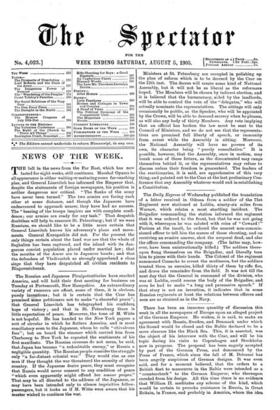Ministers at St. Petersburg are occupied in polishing up the
plan of reform which is to be decreed by the Czar on the 12th inst. The decree will create some kind of National Assembly, but it will not be as liberal as the reformers hoped. The Members will be chosen by indirect election, and it is believed that the bureaucracy, aided by the landlords, will be able to control the vote of the "delegates," who will actually nominate the representatives. The sittings will only occasionally be public, as the Speaker, who will be appointed by the Crown, will be able to demand secrecy when he pleases, as will also any body of thirty Members. Any vote implying that an official has broken the law must be sent to the Council of Ministers, and we do not see that the representa- tives are promised full liberty of speech, or immunity from arrest while the Assembly is sitting. Moreover, the National Assembly will have no powers of its own, its character being "purely consultative." It is possible, however, that the Assembly, once in motion, may break some of these fetters, as the discontented may range themselves behind it, or the representatives may refuse to discuss unless their freedom is guaranteed. The leaders of the reactionaries, it is said, are apprehensive of this very thing, and pointed out to the Czar at the last preliminary Con- ference that any Assembly whatever would end in establishing a Constitution.






































